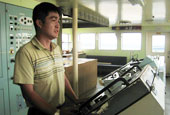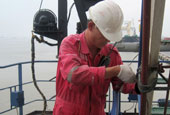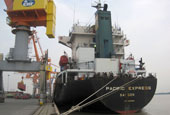Maritime Labour Convention, 2006
New Horizon for Vietnamese seafarers
With the Maritime Labour Convention 2006 now in force, ratifying countries, like Vietnam, are turning to implementation.
 Captain Tran Minh Captain Tran Minh |
“I often feel bad as my two sons have only seen me briefly, once every two weeks, since they were born. I couldn’t be with them on their first school day or take care of them as a father,” says the 35-year-old captain who has called the ocean his second home for the last 13 years. “But at least I am luckier than some seafarer friends who can visit their family only once a year.”
Long absences from home are among the many challenges that make seafaring a harsh job. Waves, winds, extreme weather, frozen food, shortage of entertainment and social activities, and having to work day or night are all part of off-shore life.
“I was told about its difficulties at university. But only when I started this job did I realize that it was far tougher than I imagined,” he says, pointing to bruises on his left eyelid. “I fell on a table edge when the ship was shaking violently in rough seas a few days ago.”
Captain Minh admits he’s thought of giving up his job several times due to its difficulties and family pressure.
 |
The nature of the job and the need to protect vulnerable workers like Minh led to the adoption of the Maritime Labour Convention (MLC) in 2006, by a special International Labour Conference of the International Labour Organization (ILO). Viet Nam became the 37th country to ratify on 8 May, 2013.
“Under the Convention, every seafarer will have the right to a safe and secure workplace that complies with safety standards, fair terms of employment, and decent working and living conditions on board ship,” explains Cleopatra Doumbia-Henry, Director of the ILO International Labour Standards Department.
Viet Nam has nearly 32,000 licensed seafarers, including about 27,000 working on Vietnamese and international vessels.
 |
“But things will improve with the ratification of the MLC,” says Trinh Cuong, Director of Vinamarine’s Shipping and Maritime Services Department.
Implementation
On 25 July 2013, Vietnamese Prime Minister, Nguyen Tan Dung, approved the national MLC implementation plan, which requires an overall upgrading of domestic marine laws by 2015; comprehensive assessment and certification for all Vietnamese ships in 2013; the establishment of a tripartite consultation mechanism involving representatives of the Government, shipowners and seafarers this year; and investment in public information and entertainment structures for seafarers at sea ports by 2020.
“I congratulate the Vietnamese Government on joining the MLC, its great efforts to bring the standards of its ships to international level and its strong commitment to protect its seafarers,” says ILO Viet Nam Country Director, Gyorgy Sziraczki.
 |
“Since the MLC is a very good document, we all want to do our best but this requires financial resources and synchronized policies from the Government,” explains Hoang Xuan Hien, legal manager of Ha Noi-based Bien Dong Shipping Ltd.
However, Doumbia-Henry believes that once they overcome the initial obstacles, it is “in the clear interest of the country to be able to enjoy the benefits that ratification brings, including better protection for seafarers and the creation of a level playing field for ships from developing countries that meet the requirements of the Convention”.
In the meantime, says Sziraczki, the ILO will “be side by side with the country to provide capacity-building and technical assistance to enable it to overcome the challenges and bring the Convention into life”.